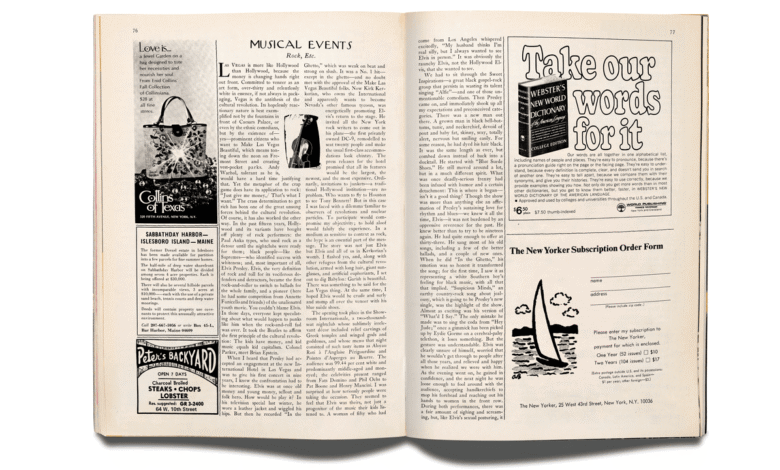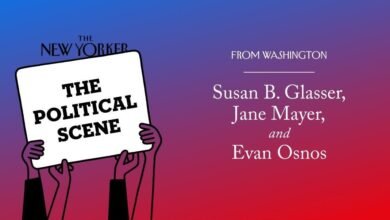
I have very little interest in Elvis Presley’s music, and I have even less interest in the mythology of Elvis as a Towering Figure in American Music. What I am abundantly interested in is resurrection, which means there are corners of the Elvis narrative that, when well illuminated, I find myself hovering over with fascination, or a kind of morbid pleasure. Ellen Willis’s 1969 review of an Elvis concert, the singer’s first in nine years, drew me right in.
There is no single thing that makes a writer like Willis great, but what makes her work compelling, and what most informs my own writing, is that Willis—The New Yorker’s first pop-music critic—was never afraid to be overtaken by unexpected delight, even if it came at the expense of some preëxisting skepticism. Those two traits—skepticism and the potential for pleasure—exist at the intersection of Las Vegas and Elvis, especially during the summer of 1969. Elvis was not yet the sweat-drenched singer laboring through the hotel residencies of the subsequent decade, sluggishly dragging himself along for the sake of a paycheck.
The Elvis whom Willis witnessed was, in fact, a man resurrected, not from the dead but from a long stretch of dissatisfaction with his own career path, which had led to film roles and soundtrack recordings and away, largely, from the stage. The previous year had marked a turnaround: there was the triumph of his comeback special, which was shot in June and aired in December. But to prove that he was fully back would require conquering Las Vegas, a place that was, at the time, “more like Hollywood than Hollywood,” Willis wrote.
There’s a striking moment in her piece, a sort of mini-twist, when you can sense Willis’s mode of observation shift from bewilderment to something that reads as genuine fascination, bordering on outright enjoyment. It happens after Elvis arrives onstage, when Willis takes him in for the first time. She’s amazed by his new, slimmer physique (“sexy, totally alert”), but also puzzled by his hair, dyed black and no longer slicked into the famous ducktail. Her confusion gives way to a sense of wonder when she realizes that, despite his efforts to look younger, he’s not interested in performing as he did in his youth. She marvels at his playfulness, becomes fixated on his earnestness; she writes, of his performance of “In the Ghetto,” that “for the first time, I saw it as representing a white Southern boy’s feeling for black music, with all that that implied.” Although Willis herself was only twenty-seven—the magazine had hired her the previous year—she appreciated his maturation. “He knew better than to try to be nineteen again,” she notes. “He had quite enough to offer at thirty-three.”
Willis’s Elvis column embodies one of her central gifts: her ability to walk you through an unfamiliar tunnel and lead you out the other side, into a bracing light, as surprised as she is that the destination looks the way it does. That this piece is not especially long causes the aforementioned twist to land even more forcefully. This is a writer saying, “We don’t have much time, and I’m not trying to change your mind, but I’m allowing you to witness how I was moved from one place to another.”
Reading Willis’s review of Elvis as he is shocked back to life reminded me that my interest in the singer goes beyond resurrection. Elvis was among the earliest of what I think of as the blank-slate pop stars, a lineage of performers, encompassing more recent figures such as Taylor Swift, who are so infused with meaning, for so many, that they become a stand-in for grand emotions and concepts whether they believe in them or not. What fuelled Elvis’s stardom was that he could contain all the projections at once, and even cultivate them. It takes a sharp critical eye to capture an artist like that, to write not about what he means but about what he is doing. That work isn’t about stripping away the romance of a performer’s appeal. On the contrary, I find it deeply romantic. Willis gave herself over to the spectacle of an Elvis who was not yet finished, an artist who remained as alive as he’d ever been. ♦





